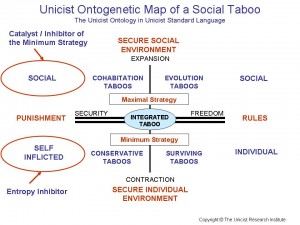Unicist Anthropology: functionality of taboos in societies
Introduction
Unicist anthropology is the description of human social behavior and evolution based on the implicit rules of the ontogenetic intelligence of nature that rule human social action.
Unicist anthropology describes the unicist ontology of human social behavior. Social behavior establishes the context of individual behavior. Therefore it limits it, catalyzes and inhibits actions and works as a dominant gravitational force in social behavior.
About Taboos
 The purpose of a taboo is to avoid destruction. Those who do not respect the taboos of a culture endanger the cultural survival, growth or identity. Therefore disregarding the taboos produces self-destruction and/or destruction.
The purpose of a taboo is to avoid destruction. Those who do not respect the taboos of a culture endanger the cultural survival, growth or identity. Therefore disregarding the taboos produces self-destruction and/or destruction.
Functionally, taboos provide a secure social environment to allow and foster actions and a secure individual environment to avoid uncertainty.
The paradox is that evolving cultures respect the taboos that are usually implicit in their protocols or rituals to prepare actions while involving cultures do not respect them.
Action requires preexisting protocols that are strictly respected in evolving cultures.
Involving cultures, on the other hand, lack protocols or generate protocols that produce fallacious myths. This means that the protocols disregard the taboos and foster non acceptable actions that degrade the culture.
At an essential operational level, the functionality of taboos requires the integration of the structuring of a secure social and individual environment based on extremely strict rules with a punishment system that includes both social and self-inflicted punishment.
Operationally, the four structural segments of taboos can be described as follows.
Surviving taboos
Surviving taboos are the ones that ensure the survival of a culture. The survival of a culture requires that all members share the fallacious myths that are installed.
Fallacious myths are apparently dysfunctional myths based on fallacies and unreachable utopias that cover the weaknesses a culture cannot deal with.
Surviving taboos avoid that cultures discuss the functionality of their extreme weaknesses. An example of surviving taboos is a culture where people usually express half of the truth.
The other half of the truth is not said generating a polemic on truth that fulfills the self-esteem of the participants. The whole truth is unbearable and those who express it are eliminated.
Conservative taboos
Conservative taboos are the explicit and implicit prohibition of dealing with aspects that might change the status quo. Conservative taboos are implicit in cultures that cannot deal with change.
Dependant cultures need to be conservative because they cannot change due to the fact that they depend on being dependant.
When a culture is dependant it has to be rigid and conservative in order to be reliable to the one it depends on.
In aligned cultures the need for conservation is installed and establishes rules that follow after the dependence has been broken. Conservative taboos imply dependence.
Cohabitation taboos
Every culture has its cohabitation taboos. There are cultures where sex, races, politics and religions cannot be discussed in social meetings.
On the other hand, there are cultures where the discussion of politics is part of their social rituals. This implies that every culture establishes the cohabitation taboos that are functional to its archetypes.
The archetype of a culture requires that some aspects, those who cover unbearable facts, cannot be discussed. This has to be strictly respected because it is part of the culture’s success.
Evolution taboos
Evolution implies paying prices in the social field. These prices necessarily affect people. Evolution taboos imply the avoidance of clarifying the prices a culture is paying for its evolution.
The few, the ones who guide the evolution, know what is happening. But the mass of the society needs to avoid facing the prices and establishes implicit taboos on those aspects that cannot be dealt with.
An evolution taboo implies the “denial” of the fact that evolution necessarily implies that somebody is being left behind. Without these taboos societies could not evolve.
Conclusion
Unicist anthropology approaches human behavior based on its essential drivers which are the taboos of a society that “hide” the expansion and contraction of cultures, the myths that provide the security framework and the utopias that provide the drivers for actions and, therefore, for evolution.
Peter Belohlavek
NOTE: The Unicist Research Institute was the pioneer in using the unicist logical approach in complexity science research and became a private global decentralized leading research organization in the field of human adaptive systems. It has an academic arm and a business arm. https://www.unicist-school.org/theoryofevolution/wp-content/uploads/2015/11/turi.pdf